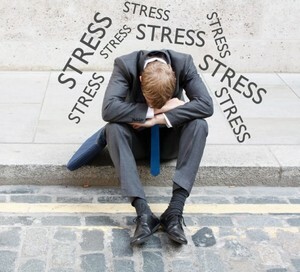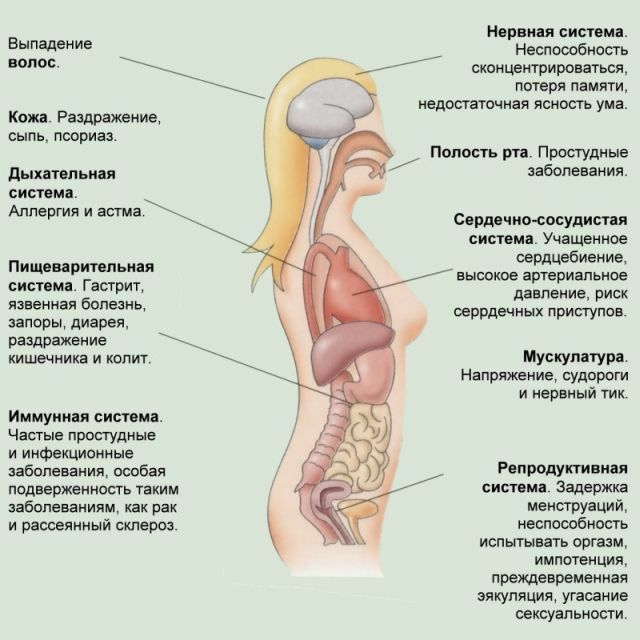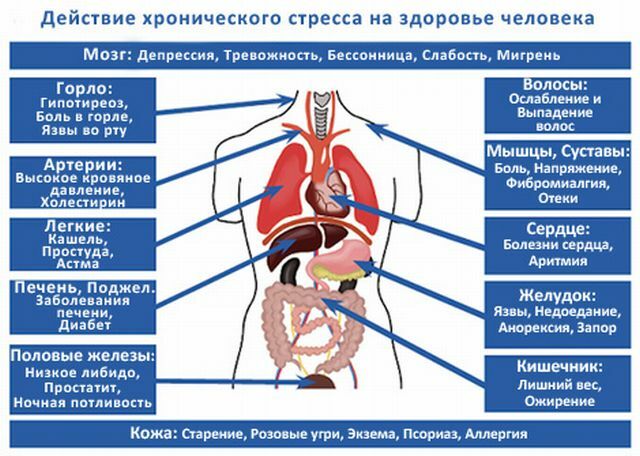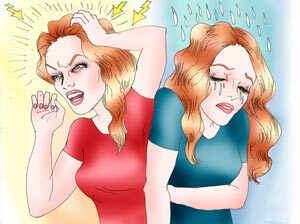 Stress is a condition in which: a foci of excitement arises in the brain, then a powerful dose of adrenaline and other "stress hormones" is released into the blood.
Stress is a condition in which: a foci of excitement arises in the brain, then a powerful dose of adrenaline and other "stress hormones" is released into the blood.
If the situation is not resolved, the focus of excitement grows, adrenaline continues to enter the bloodstream and poison the central nervous system.
The consequences of this intoxication can be sad for every body system.
Content of
- Different stress - different consequences
- Good shake: positive stress
- Stress negative, life-saving
- Acute and chronic stresses
- Why does stress "break" the body?
- Consequences of chronic stress - tezisno
- With the stress of life
- The most important thing - the weather in the house
- At work, as a parade?
- You are my friend and I am your friend. ..
- How to escape from overvoltage phenomena?
Different stress - different effects of
Stress is very different. In terms of time parameters, it can be acute, or chronic. By nature: positive and negative. On the influencing factors: physiological and emotional.
Positive stress triggers the same mechanisms in the cerebral cortex as the negative one. A similar picture: the same persistent focus of excitement, the same adrenaline and cortisol in the blood. If the positive stress is short-lived, the body will receive less damage. If long - the consequences will be more serious.
Sudden joy can inspire, and can kill. This is known to everyone at a subconscious level. Therefore, often even to unexpected joyful news a person must somehow be prepared.
Good shake: positive stress
The most healthy and useful type of stress is physiological. A short, sharp impact on the body has the effect of electric shock. This is a good lotion for immunity.
She shakes a man like a dust bag and mobilizes all organs and systems. The simplest example of the beneficial effect of physiological stress on the body is dousing in ice cold water.
Instantaneous cold shock acts like a burn. One such feat can launch powerful forces in the body and stir up hidden reserves. Such shakes are useful for physical and mental health.
Stress negative, life-saving
How positive stress can sometimes kill, so negative sometimes saves a life. What a person in a similar state is capable of, the  can sometimes be difficult to fit into the head.
can sometimes be difficult to fit into the head.
There was such a case in the North. The pilot came down to earth from a plane for a small need. And a nose to the nose collided with a polar bear.
The bear was big and strong, and the pilot was in unbuttoned pants. And, nevertheless, without having time to think about anything, the pilot jumped up one and a half meter up and found himself on the wing of the plane.
Never after, neither he nor the bear could explain how this happened. The pilot only shyly shrugged his shoulders. Discouraged bear went away to look for a less jumping game.
Acute and chronic stresses
Acute stress is dangerous, but its effect on the body can be short-lived. Getting rid of the source of negative emotions, taming the dominant that has flashed in the brain reduces the degree of heat of passions.
Worse is the situation with chronic stress, with a situation that can not be resolved, or somehow neutralize the source of excitement. Everyday negative emotions give rise to a stagnant focus of excitement in the brain.
The blaze of this focus seems to extinguish the work of other nerve centers. Chaos and anarchy begin at the command post of the higher nervous system. It forgets its purpose - to regulate the body. And it starts a full rage at all levels and in all systems:
- , first of all, the psycho-emotional sphere of the organism's activity comes out of control;
- followed by breakdowns in the vegetative and endocrine system;
- is the most powerful blow to the hypothalamus - the highest center of nervous regulation - this modest body is the curator of such archival aspects of life, as: sleep, metabolic processes, appetite, vascular tone, body temperature.
This is a general picture of what happens in the body in a stressful situation.
Why does stress "break" the body?
 Existence against a background of chronic tension causes the nervous system to defend itself. As a protection mechanism, she gives a command to the adrenal glands. Those throw up in the blood increased doses of adrenaline and cortisol.
Existence against a background of chronic tension causes the nervous system to defend itself. As a protection mechanism, she gives a command to the adrenal glands. Those throw up in the blood increased doses of adrenaline and cortisol.
These "stress hormones" are necessary for the body to fight the danger signaled by the brain. The energy release is incredible( just enough to take the height of your own growth).
The received energy of protection should be used for the purpose: to escape, or to catch up, to jump over obstacles, to fight for one's life. If this does not happen, all the adrenaline rushed into the blood is not spent on anything.
And hormones, kindly provided to us for defense, do not find application. They have nowhere to go, but they can not remain idle. Not aimed at actively fighting the causes of suffering, "stress hormones" are taken slowly to poison the body at all levels, the effects of which are felt by all body systems:
- The cardiovascular system begins to work in high alert mode: pulse and breathing quicken, heart furiously contracting, pressure onthe walls of the vessels increase several times. Strokes, heart attacks are extreme degrees of reaction to a stressful situation.
- Endocrine system .The hormonal balance is disturbed, against which a person is overtaken by such vipers of the century as thyroid diseases and diabetes mellitus.
- Stomach and intestines .The luminaries of medicine have long ago linked stress and the occurrence of stomach ulcers. About violations of digestion and intestinal disorders( constipation, diarrhea) can not even speak.
- Genitourinary system .During the war, for example, women lost menstruation. It was such a temporary unexplained climax, which many ended at the same time as the war. From stress and now a woman can overtake the early menopause, and even the inability to conceive.
- Skin covers .And who else does not know that the extremely unaesthetic and painful disease of psoriasis is the result of the stresses? Eczema, a scattering of acne, squamous lichen - all these are "illnesses from nerves".
- The highest nervous system of is that it takes the most devastating blow. The starvation of brain cells begins because of spasm of blood vessels, which leads to disturbances of blood supply and blood circulation in this organ. A violation of sleep, depression, VSD syndrome, neurosis and chronic fatigue - the consequences of all the same stress. A strong shock can provoke a serious mental disorder and give rise to the development of all kinds of phobias.

Consequences of chronic stress - tezisno
If the focus of the brain is not neutralized in the cerebral cortex and the stress gradually flared up to chronic, the consequences can have a sad ending:
- susceptibility to panic attacks and a high level of anxiety;
- sudden angry flares and an "explosive" reaction to the most insignificant stimulus;
- predisposition to depressive states, dangerous to the psyche and often endangering the existence of the individual;
- apathy and loss of any interest in life;
- memory dips, diffuse attention and inability to concentrate.
Such states can immerse a person in his personal, separately existing hell. The flight from the inner hell to the illusory paradise is achieved by the easiest( it's the same - deadlock) way.
Alcohol, stimulants, toners, drugs are the usual ways to reconcile dreams with reality. The rich experience of former alcoholics and drug addicts does not usually convince them that temporary escape from their problems does not solve them, but aggravates the situation.

With the stress of life
Strange thing is observed in our world. Since the Stone Age, people have been busy trying to protect themselves from the factors that threaten their existence.
For hundreds of years, mankind has been striving to create the most comfortable conditions for life. But since the time of the first parents, the number of hazards facing a person has not decreased, but has increased hundreds of times. The causes that cause a sense of disaster, have changed, but their number continues to progress.
Fierce animals do not roam the streets, you do not need to captivate mammoths to feed yourself, you do not need to keep the fire in the cave, so as not to lose the source of heat and light. But now we are at every turn trapped by predators in modern guise.
The most important thing - the weather in the house
You can get "stress on the forehead" without leaving the apartment. Own house-fortress is fraught with innumerable threats to health.
The reasons for spoiling the "weather in the house" for a long time are thousands:
- The employment, busyness, career growth of - all this leaves little time for full communication within the family, and the
 forms cracks.
forms cracks. - Spouses have no time to delve into the problems and pleasures of each other .No time for raising a child. On this basis, quarrels, scandals and mutual accusations break out. Health does not add, but gradually leads to a slow physical and mental exhaustion.
- Stamina in money, family planning, child rearing issues , mutual insults and misunderstandings, physical, or emotional abuse within the family, adultery, divorce - this is the soil on which fluffy inner-family stresses blossom.
At work, how is the parade?
Work - this is a real hotbed of dangers:
- if you go to it, as sentenced to an exceptional measure of punishment - this in itself is the source of chronic dissatisfaction;
- chief, at the sight of which the "dance of St. Vitus" begins by itself, in five minutes will break in your stress-resistance;
- colleagues who climbed above you on the career ladder - the boorish, undermining self-esteem;
- an irresistible fear of losing a job and a financial meltdown turns life into a hell and keeps in a state of perpetual tension.
You are my friend and I am your friend. ..
Communication is also one of the stressors. Not everyone is born a genius of communicability, for many even support a conversation - an attempt not from the lungs. What can I say about speaking in front of an audience, or trying to get a conversation with a stranger.
Mankind is covered by an epidemic of social phobia. Fear of communication can cause the entire symptom complex of physical and emotional disorders.
The loss of a loved one, the serious illness of a relative, the fear of death are all factors that fuel fears of life and drain our strength.
How to escape from overvoltage phenomena?
There are no more reasons for the experience, and the consequences from the development of stress in their time remained for a long time, if not forever. We'll show you how to avoid this:
- Do not think, do not remember, do not scroll past events and do not try to mentally replay them. We must forget about them, do not think. How not to think about the red cow? Think about a green parrot! You can not "pull yourself together" and "throw out of the head" a traumatic situation. Do not think that you were wounded in only one way - think about something else. This is called the displacement method.
- Movement - life, inhibition - fatigue .Running and just walking in the air can recreate the psyche of a person, heal the
 from any spleen. It is necessary to walk for a long time and it is better to attach some kind of load. Greatly helps "walking at two tempos": one hundred meters to go with the usual speed, then abruptly switch to a fast pace and again return to a calm pace.
from any spleen. It is necessary to walk for a long time and it is better to attach some kind of load. Greatly helps "walking at two tempos": one hundred meters to go with the usual speed, then abruptly switch to a fast pace and again return to a calm pace. - Remember, with what ardor were given to their hobbies .Start painting again, writing poetry, diving, swimming, embroidering with a cross. Everything that gives you pleasure and leads to a state of harmony, will help to overcome the consequences of what has been experienced.
- Learn to breathe properly .Relaxing breathing: breathe in the air as much as possible. Make a pause and exhale by jolting three counts. Most consciously yawn and exhale. This is also an exercise to restore the nervous system. Yawning and exhalation relief - physiologically the body's reaction to the fact that he is safe. In fact, in a moment of danger, it's hard to imagine a serenely yawning person, or a person who exhales lightly.
- Increase the quality of communication : communicate a lot, but only with those who are able to recharge you with their optimism. The ability of people to induce( infect) each other with their mood and emotional state in our case is very successful. Psychiatrists often adopt certain features of their patients, pick up a psychic infection. Let's use this fact for our own benefit: communicate with positive, full of solar energy people. Be sure to "pick up" from them what they radiate: trust in life and powerful mental health.
- Help another .The best way to forget about your own suffering is to actively participate in the problems of someone else. It has a powerful therapeutic effect. For example, after working as a volunteer in the children's cancer department, you will realize that it was done in vain for so long to be depressed by heavy millstones of stress.
Tell the stress "No!" Right now.



